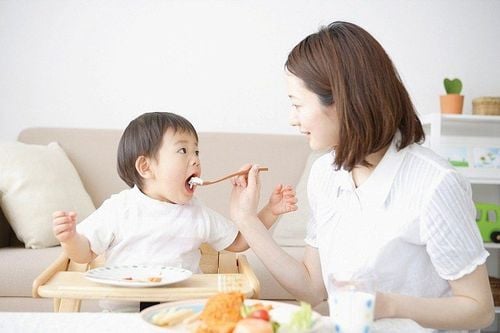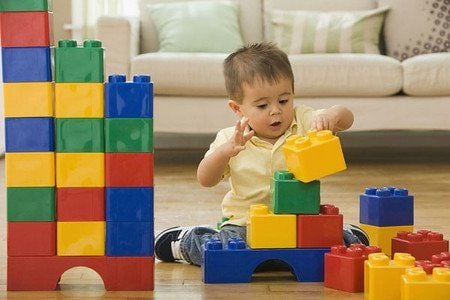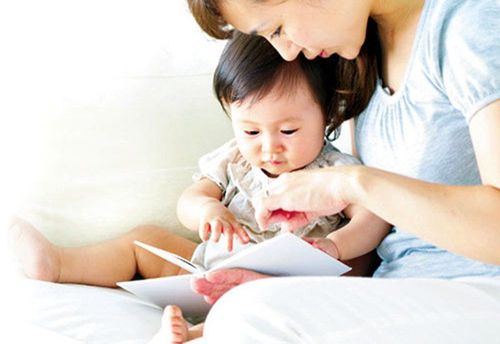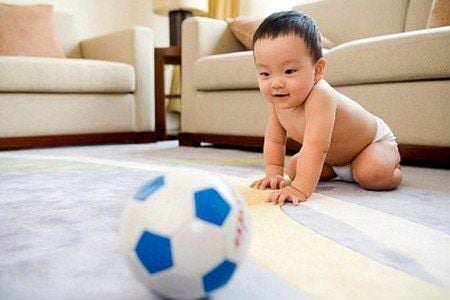This is an automatically translated article.
Children always develop at a rapid rate and the difference is evident day by day. Children 18 months old have language development characterized by the ability to speak loudly and clearly. In addition, this article provides additional information to help parents understand what 18-month-old babies know how to have more appropriate support and interactions.
1. Characteristics of 18-month-olds: Speak loudly and clearly
What do 18-month-olds know?
By the age of one and a half or 18 months, most children speak a dozen or more words clearly. Besides "mom" and "dad," favorite words include "bye-bye," "milk," "dog," "cat," "oh !," and "em." Many 18-month-olds can also link two words together to form a rudimentary sentence - a sentence without a linking verb or other linking words. The child may say "It's over", "Want the ball" or "I'm up".
Your 18-month-old may still babble, mimicking adult conversations he hears. However, with increasing frequency, parents may be able to hear clear words amidst the slurs. However, if your 18-month-old can't say at least two words, be sure to mention that to your baby's healthcare provider at the next checkup; The health care provider may want to check the child's hearing or have an evaluation by a speech-language pathologist.
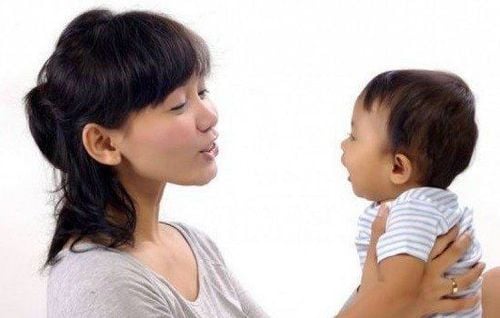
Hầu hết trẻ 18 tháng có thể phát âm rõ ràng và có một vốn từ vựng nhất định
Tone is expressed through a fraction of the volume and an 18-month-old can quickly recognize it. Because children's vocabulary is still limited, they use a combination of simple words, thought, and body language to express their ideas clearly. In fact, you might be surprised how much your child can tell you with just a few words. When children say "cake", they are not merely contemplating their favorite food. Parents can understand that what the child is really saying is, "I want a cookie - right now!" through their voices.
Many 18-month-olds are also beginning to say their own names. It will be a few months before children can use other pronouns more commonly.
2. What can parents do to help their 18-month-old child develop language and cognition?
At this stage, it's better to appreciate what the child has to say than to try to correct the "mistakes". For example, if your child says, "Want to sell," don't correct it with "No, say cake." Parents should say, "Okay! Here's a cake!" Modeling correct word usage on your own will help children learn faster than adults editing them out completely. And not being constantly corrected will help boost an 18-month-old's confidence and eagerness to learn or experiment with new words.
Listen to children's tapes or discs together; It's a great way to hone an 18-month-old's listening skills, and parents may be surprised by the number of words children learn from songs.

Cùng nghe băng đĩa nhạc thiếu nhi để trau dồi kỹ năng nghe và nhớ của trẻ
3. What can an 18-month-old child do?
In addition to language ability is always developed, 18-month-old children can improve understanding and memory training through games. Children can already begin to realize that every toy, every animal, every person, everything has a name. And children rely on their parents to learn names. Children constantly point to pictures in books and ask, "What is that?" Or the child repeatedly points at the pictures until the parent names the picture. Children understand more words than they can say easily and are recording information for later use.
Between 18 and 24 months, toddlers begin to be able to think about things that are not present. Children know that their shoes are in their closet and will go get them if you ask them to. Or the child stands in front of the pantry and asks for a cracker, which he knows is there even though he can't see it. If you want to test this ability of your child, play a very basic version of the game Focus. Hide a favorite toy under two or three blankets. Children won't be considered a failure when they get rid of the first grade without seeing the toy - they will keep looking. In fact, children will be happy to find hidden things.
For children to be healthy and develop well, it is necessary to have a nutritious diet in terms of quantity and quality balance. If children are not provided with adequate and balanced nutrients, it will lead to diseases of excess or lack of nutrients, which adversely affect the comprehensive development of children in terms of physical, mental and motor skills.
Parents should supplement their children with supportive products containing lysine, essential micro-minerals and vitamins such as zinc, chromium, selenium, and B vitamins to help fully meet their child's nutritional needs. At the same time, these essential vitamins also support digestion, enhance nutrient absorption, help improve anorexia, and help children eat well.
Parents can learn more:
Signs of zinc deficiency in children
Micronutrient deficiency and failure to gain weight in children
Please regularly visit Vinmec.com website and update useful information to take care of your child. Take care of the baby and the whole family.





